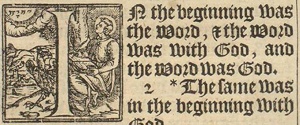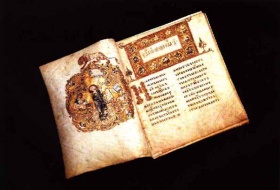John 1:1
From Textus Receptus
(Textus Receptus, Novum Testamentum, Theodore Beza, 5th major edition. Geneva. 1598)
(King James Version, Pure Cambridge Edition 1900)
(King James Version 2016 Edition, 2016)
Contents |
Commentary
The phrase "the Word" (a translation of the Greek word "Logos") refers to Jesus Christ, as indicated in other verses later in the same chapter (John 1:14). This verse set the stage for later developments in Trinitarian theology and Christology. It clearly demonstrates that the Son has eternal pre-existence with the Father.
Of the Gospels, John has the highest Christology. Here Jesus is the only begotten Son of God, the Way, the Truth, the Life, the True Vine, etc. In 1:1, John identifies Jesus as the Logos, that source which made the existence of the created world possible.
Gordon Clark a Calvinist theologian and expert on pre-Socratic philosophy, famously translated Logos as "Logic": "In the beginning was the Logic, and the Logic was with God and the Logic was God." He meant to imply by this translation that the laws of logic were contained in the Bible itself and were therefore not a secular principle imposed on the Christian worldview.
Following Jesuit translations of the 18th Century, today most Chinese Bible translations use the word "Tao" in John 1:1 to translate "Logos", following the use as "Idea" in Taoism.
In unitarian Christology there are other interpretations of John 1:1. In the commentaries on John ch.1 by Lelio Sozzini (Zurich, c.1559) and his nephew Fausto Sozzini (Lyons, c.1562) the "word" being "made flesh" is taken as a reference to the virgin birth, and not to the personal pre-existence of Christ. The passages in the New Testament referring to the Logos were explained by Fausto Sozzini as relating to the foreknown work of Christ as the author of the new creation, not as relating to the "old" Genesis creation. Fausto Sozzini aimed to "completely de-Platonize" the reading of John 1:1-15.
Greek
Textus Receptus
Complutensian Polyglot
- 1514 Ἐν ἀρχῇ ἦν/ὁ λόγος, καὶ/ὁ λόγος ἦν πρὸς/τὸν Θεόν, καὶ Θεὸς ἦν/ὁ λόγος, (Complutensian Polyglot)
- en arche en ho logos kai ho logos en pros ton theon kai theos en ho logos. Textus Receptus transliteration
Other Greek

- 1869 Ἐν ἀρχῇ ἦν ὁ λόγος, καὶ ὁ λόγος ἦν πρὸς τὸν Θεόν, καὶ Θεὸς ἦν ὁ λόγος. (Tischendorf - Editio Octava Critica Maior)
English Translations
- 1380 In the biginnynge was the word and the word was at god, and god was the word, Wycliffe's Bible
- 1560 In the beginning was the Worde, and the Worde was with God and that Worde was God. (Geneva Bible)
- 1568 In the beginning was the Word, & the Word was with God, and that Word was God. (Bishops' Bible)
- 1611 In the beginning was the Word, & the Word was with God, and the Word was God. (King James Version)
- 1898 In the beginning was the Word, and the Word was with God, and the Word was God.(Young's Literal Translation)
- 1999 In the beginning was the Word, and the Word was with God, and the Word was God. (American King James Version)
- 1901 In the beginning was the Word, and the Word was with God, and the Word was God. (American Standard Version)
Foreign Language Translations
Albabian
Në fillim ishte Fjala dhe Fjala ishte pranë Perëndisë, dhe Fjala ishte Perëndi.
Armenian
Սկիզբէն էր Խօսքը, ու Խօսքը Աստուծոյ քով էր, եւ Խօսքը Աստուած էր. (Western)
Arabic
Bulgarian
- В началото бе Словото; и Словото беше у Бога; и Словото бе Бог.
Croatian
- U početku je bio on, Riječ, i on, Riječ, bio je s Bogom i on, Riječ, bio je Bog.
Danish
- I Begyndelsen var Ordet, og Ordet var hos Gud, og Ordet var Gud.
French
- 1864 Au commencement était le Verbe, et le Verbe était en Dieu, et le Verbe était Dieu. (Augustin Crampon)
- 1910 Au commencement était la Parole, et la Parole était avec Dieu, et la Parole était Dieu. (Louis Segond)
- 2006 Au commencement était la Parole, et la Parole était avec Dieu, et celui qui est la Parole était Dieu. (King James Française)
German
- 1545 Im Anfang war das Wort, und das Wort war bei Gott, und Gott war das Wort. (Luther)
Greek
- 1638 (Modern Greek)
Indonesian
- Pada mulanya adalah Firman; Firman itu bersama-sama dengan Allah dan Firman itu adalah Allah. Terjemahan Baru (TB)
- Pada mulanya, sebelum dunia dijadikan, Sabda sudah ada. Sabda ada bersama Allah dan Sabda sama dengan Allah. Bahasa Indonesia Sehari-hari (BIS)
Italian
The term "logos" in the Christian tradition is rendered in Italian as "verb," taking a calculated Latin "verbum."
- 1649 NEL principio la Parola era, e la Parola era appo Dio, e la Parola era Dio. (Diodati Bible)
- 1927 Nel principio era la Parola, e la Parola era con Dio, e la Parola era Dio. (Riveduta Bible)
Latin
- in principio erat Verbum et Verbum erat apud Deum et Deus erat Verbum (Vulgate)
Russian
The first translation of this type in the Slavic language translators implemented the Holy Scriptures of Saints Constantine-Cyril the Philosopher and his brother Methodius.
- Ен архэ̃ь э̃н ъо Ло́гос, ка̀й ъо Ло́гос э̃н про̀с то̀н Тъео́н, ка̀й Тъео̀с э̃н ъо Ло́гос. Russian Transliteration of the Greek
- В началѣ бѣ слово и слово бѣ къ Богу и Бог бѣ слово (Church Slavonic)
Spanish
- 1569 En el principio ya era la Palabra, y aquel que es la Palabra era con el Dios, y la Palabra era Dios.
Swahili
- Hapo Mwanzo, Neno alikuwako; naye alikuwa na Mungu, naye alikuwa Mungu.
Swedish
- 1917 I begynnelsen var Ordet, och Ordet var hos Gud, och Ordet var Gud.
Turkish
- Başlangıçta Söz vardı. Söz Tanrıyla birlikteydi ve Söz Tanrıydı.
Ukrainian
- Упочинї було Слово, й Слово було в Бога, й Бог було Слово.
Versions agreeing with the KJV
ASV, Darby, Douay, EMTV, ERV, KJV21, LO, Noyes, RWebster, WEB, Webster, WEY, Youngs.
Other Mistranslations
- 1 From the first he was the Word, and the Word was in relation with God and was God. (BBE)
- 1 In a beginning was the Word, and the Word was with the God, and a god was the Word. (Diaglot)
- 1 In the beginning the Word already existed. The Word was with God, and the Word was God. (GWV)
- 1 Originally, was, the Word, and, the Word, was, with God; and, the Word, was, God. (Rotterham)
- 1 In the beginning the Word existed; and the Word was face to face with God, yea, the Word was God Himself. (Williams)
Translations by James Moffatt, Hugh J. Schonfield and Edgar Goodspeed render it:
"...and the Word was divine."
Patristic quotes
Christian apologist Justin Martyr (c 150) identified Jesus as the Logos:
- I shall give you another testimony, my friends, from the Scriptures, that God begot before all creatures a Beginning, [who was] a certain rational power [proceeding] from Himself, who is called by the Holy Spirit, now the Glory of the Lord, now the Son, again Wisdom, again an Angel, then God, and then Lord and Logos; (Justin Martyr, Dialogue with Trypho, Chapter 61.)
Commentaries
See Also
- John 1:1 (NWT) John 1:1 in the New World Translation of the Jehovah's Witnesses
- Jesus Christ the Logos






